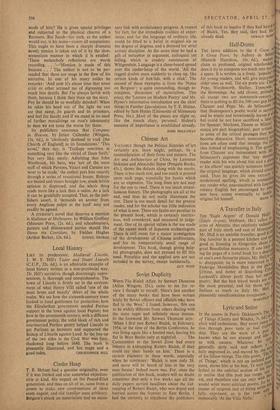Lyric and Satire
Si IF the poems in Patric Dickinson's Tljeor of 7'hings (Chatto and Windus, 7s. 6d) h., elicit wild enthusiasm, they never cau50 on through poor taste or bad CraftS1 t ship. They are the Work of a d f'°c' knows what he can attempt and whc so with success. Whatever he says ml generally aiptly said and reflects °weir? fully engrossed in, and moved by, Ihe,'; sd of his fellow-beings. The title poem, 'r,1'`,-1) of Things,' which is not an isolated oai ment, shows him at his best. To turn. Ir;00 lyrical to the satirical section of his ,st $ to realise that this poet has range, that wit, and therefore one can only WiSh be ii would write more ,satirical poems, for beat/ satire.t
. master of epigram and of biting
fully expressed, as is the case WIp memorable At the Villa Nelle.' co










































 Previous page
Previous page